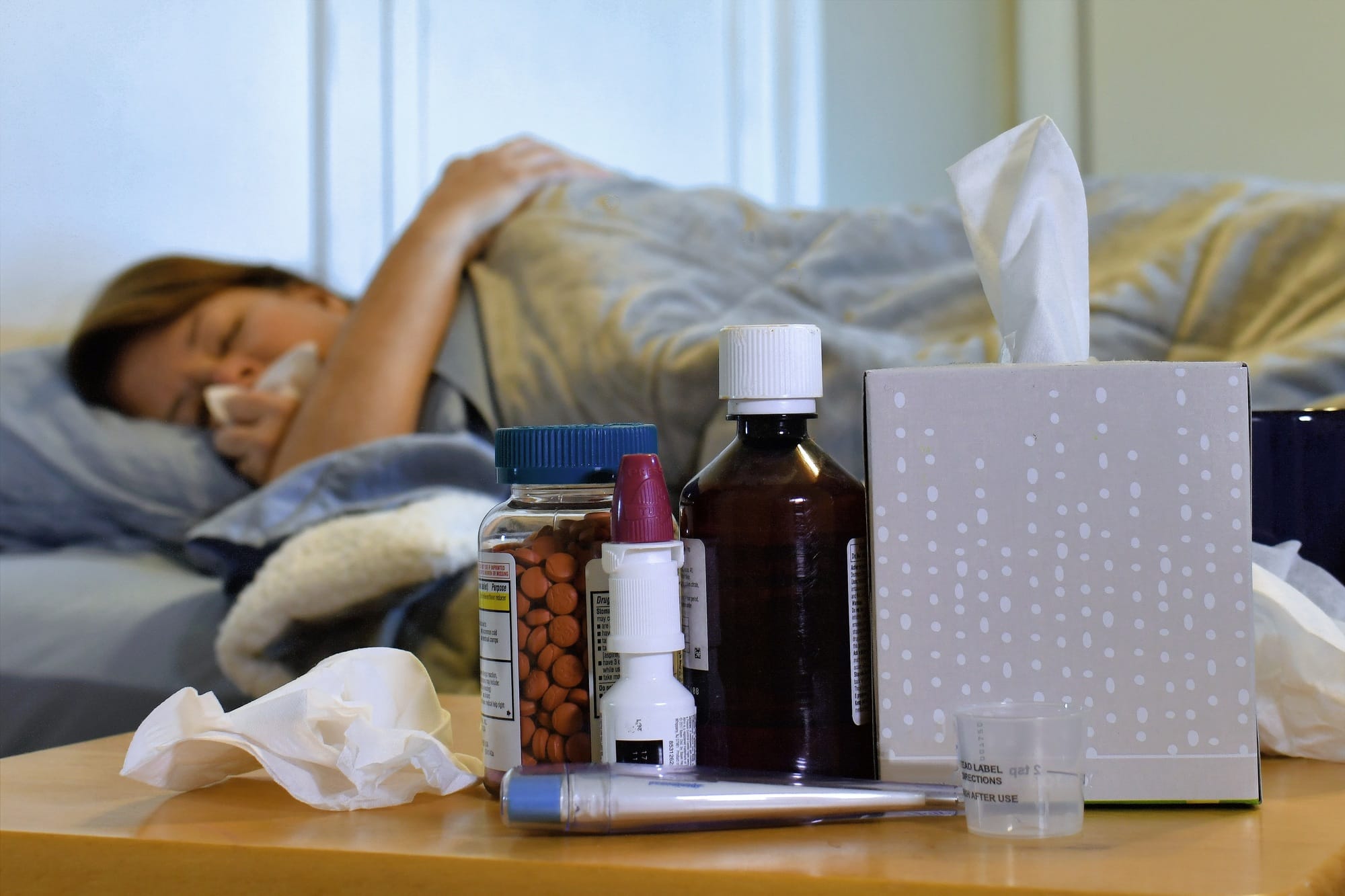The Holiday Season is a great time for celebrating with friends and family but also puts us at risk for catching the common cold. Every year millions of people especially during the fall and winter months gets sick with a respiratory infection or cold with the average adult catching 2-3 colds per year.
What is the common cold?
The common cold is a viral infection of the upper respiratory tract that causes our nose to run, throats feel sore, gives us a dry cough, makes our body ache, eyes water and overall feel tired and lousy. It is caused by over 200 different cold viruses with about 50 % due to rhinoviruses.
Most of the time a cold result in a few sniffles and goes away but for some people with weakened immune systems, older age, or those with chronic illnesses it can be more serious.
Is the common cold very contagious?
It is very contagious and transmitted from person to person through coughing and sneezing cold virus particles in the air and even off of contaminated surfaces. People who are sick are most contagious when their symptoms are the worse but also can spread infection before symptoms appear.
During social gatherings especially indoor events, the risk of catching one of these pesky viruses goes up as easily passed from person to person through coughing, sneezing, or direct contact of contaminated surfaces such as doorknobs, spoons or keyboards just to name a few.
How to prevent getting the common cold at social gatherings?
There are tactics to use to avoid picking up a cold virus with the most important being frequent hand washing with soap and water or using alcohol-based hand sanitizer can also do the trick.
Other tips include avoiding close contact with sick people, covering mouth and nose and when coughing or sneezing or reminding others to do so. Avoid frequent touching of your face especially eyes, nose and mouth-the virus gets in through these membranes-after coming in close contact with someone who might have a cold or surrounding objects or surfaces that may carry a lingering virus as this is how the cold virus gets you sick.
How do I treat a cold if I get one?
There is no cure for a cold and usually runs its course for 7 to 10 days and goes away on its own. Antibiotics do not help as a cold is caused by a virus not bacteria.
Symptoms of running eyes, cough, headaches, and congestion can be treated with over-the-counter medications including decongestants, cough suppressants like dextromethorphan or Robitussin, pain relievers like Tylenol (Acetaminophen), and antihistamines. Zinc, Vitamin C (fresh oranges are best), and Echinacea have been used for immune boosting properties but limited evidence that it prevents or treats a cold although Zinc and Vitamin C may decrease cold symptoms by 1-2 days. Intranasal Zinc (nose spray) may lead to permanent inability to smell (anosmia) so should be avoided.
There are even reports of wearing wet socks or putting sliced potatoes inside socks before bedtime with the idea that it pulls the cold virus into the feet and out of the body. Of course, this is purely a myth, but some swear by it.
Any natural remedies to help with a common cold?
Drinking plenty of fluids including water, juice, clear broth or warm lemon water with honey (for people over age 1) can help. Warm liquids can ease the stuffiness by increasing mucus flow. Honey is helpful to relieve a cough. Saltwater gargle using 1/4 to 1/2 teaspoon of salt in 8-ounce glass of warm water (adults only) may help with a sore throat. And consider adding a cool-mist vaporizer humidifier changing the water daily and using manufacturer’s instructions can also help with stuffiness and clear airways and do not discount a nice steamy shower or sauna as is an awesome natural decongestant.
Chicken soup, a classic favorite, per a study at Nebraska Medical Center, may have anti-inflammatory effects that speeds up recovery. And consider adding an extra pillow at night to help with sinus drainage.
Does getting chilly or wet cause a cold?
No, is a myth as the common cold is caused by viruses that enter through the membranes or linings of the nostril (nose), mouth or eyes not by getting cold. That said, in the winter months when it gets cold the membranes can lose their moisture and get dry especially if you do not hydrate with fluids leading to a greater risk of the cold virus getting into your system causing infection.
When do I seek medical attention for a cold?
In general, a common cold should resolve on its own with supportive care including over the counter medications, lots of good sleep, hydration, and a healthy diet.
Reason for seeing your doctor is if symptoms last longer than 10 days, unusually severe symptoms, high fevers, dehydration, severe muscle pain, difficulty with breathing, or a cough with mucus that is yellow or green as may be a sign of a bacterial infection that needs treatment with antibiotics.
If you have severe muscle pain and fever (unusual for a common cold) this may be caused by the flu or influenza and when caught early can be treated, or if symptoms suggestive of COVID-19 including loss of taste, diarrhea or worsening respiratory systems. Your doctor can test using a nasal swab (swab in the nose) for flu or COVID-19 and decide the best course of treatment.
Any last thoughts on how to avoid the common cold during the Holidays?
In general, everyone at some point gets the common cold with the highest risk during the Holiday season with more indoor social gatherings, sharing of food and drink, and person-to-person contact. Your best bet not to miss the fun and festivities by getting a cold is to use simple rules of social engagement: frequent hand washing with soap and water or use of hand sanitizer, covering your mouth or nose when sneezing or coughing and a gentle reminder for others to do the same, and to keep your immune system in check by drinking lots of water, getting enough rest, exercise, and a healthy diet.
If your symptoms worsen or are not typical for a cold, contact your doctor or if you have difficulty breathing seek medical attention immediately.
If you have any questions, AskDoctorH, we are here to help.




 Have Questions? AskDoctorH
Have Questions? AskDoctorH